



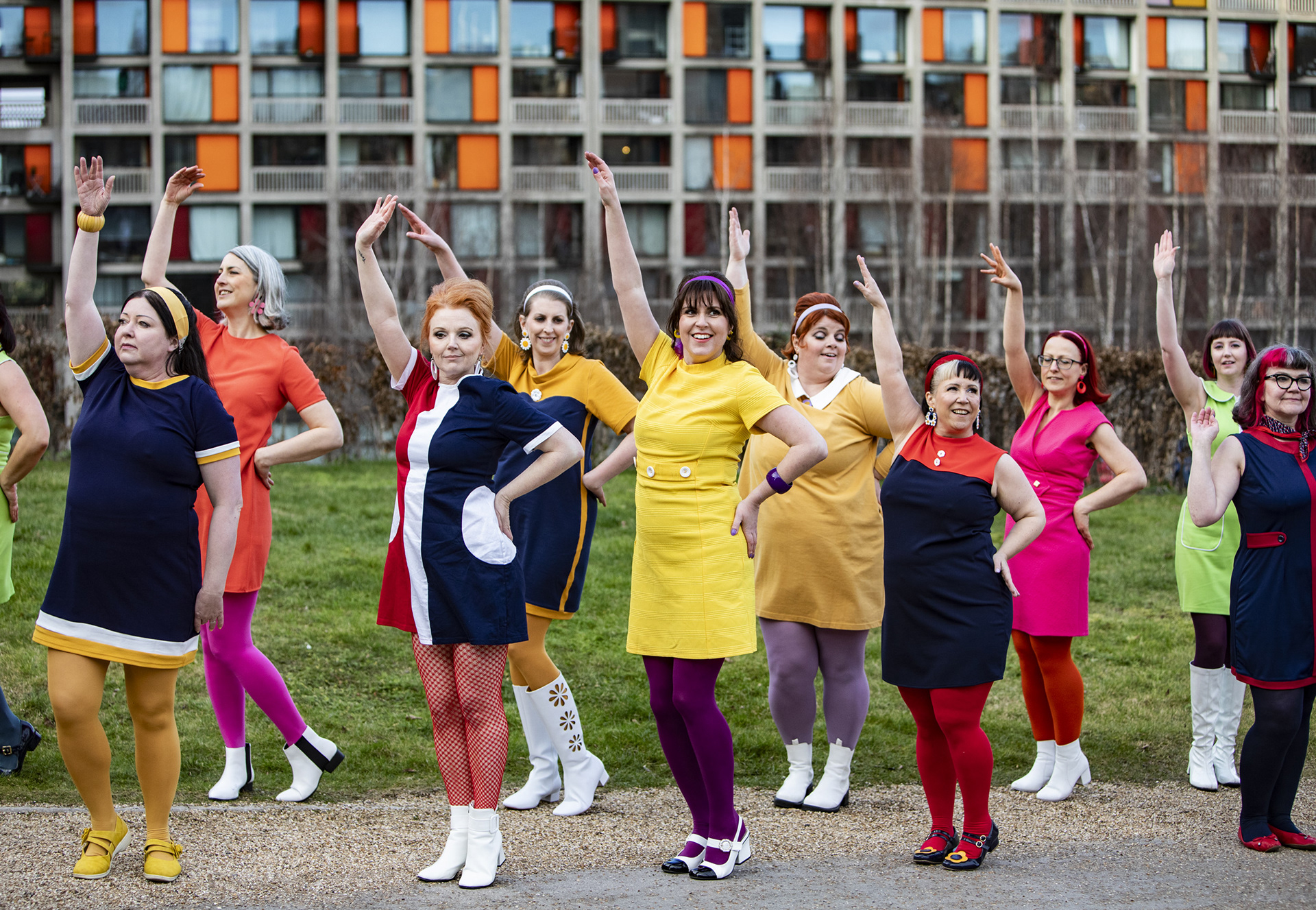
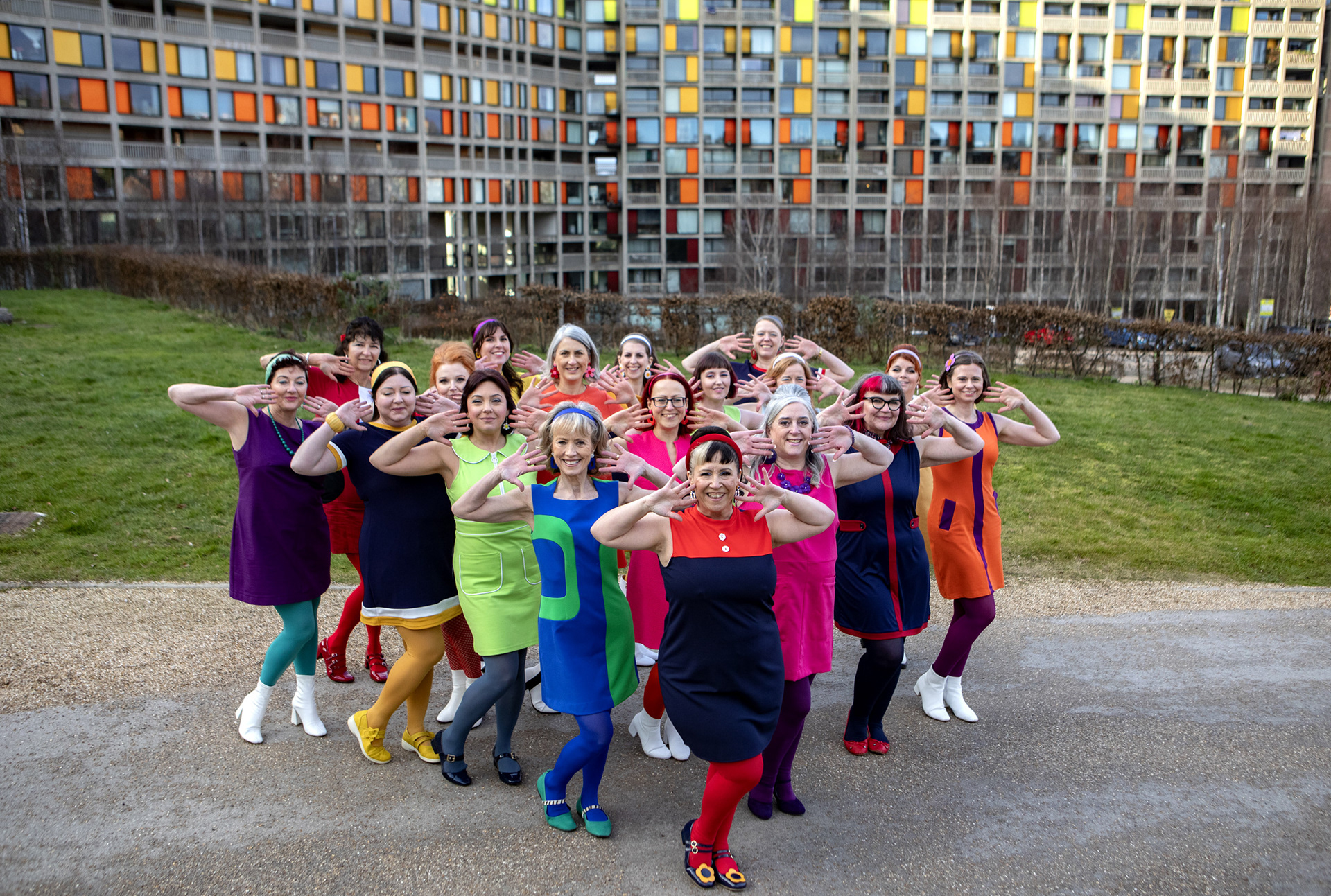
Sheffield Dancers Recreate A Sixties Vibe As They Rehearse Their
International Women’s Day Event At The City’s Iconic Park Hill Flats.
Dancers from Sheffield’s ‘Charleston a Go-Go’ dance group brought a touch of sixties nostalgia
back to Sheffield's iconic Park Hill flats – built in 1961 and Europe’s largest Grade II listed
building – when they rehearsed their moves ahead of their International Women’s Day charity
event to raise funds for Saffron, the city’s only psychotherapy service offering free specialist
counselling for women who have suffered trauma or abuse.
Caroline Thompson,46, who organised the dance rehearsal and teaches vintage dances at
different venues in the city, has also worked as a mental health practitioner for the last 10 years.
She says: “Saffron does great work offering free long-term therapy to women who are survivors
of abuse, trauma, sex trafficking and mental health issues such as anxiety and PTSD. We want
to raise awareness of the work they do and also show the joy of women dancing together and
supporting each other as we celebrate and acknowledge International Women’s Day.”
The self-proclaimed ‘retro dance geek’, is well aware of how “mood-boosting” dance can bring
women together and enable them to “let go and mentally escape” at her Charleston a Go-Go
classes by learning a whole range of dances from different eras (hence the name of her dance
business), including the 60s – one of her favourite decades. One of her favourite 60s photos is
‘Girls in the Windows” shot by Ormond Gigli in 1960, which shows 41 women in bright sixties
outfits in a 60s Manhattan brownstone building.
“We thought we’d pay homage to that image by dressing in bright 60s outfits and dancing on the
walkways and in the communal gardens of Park Hill flats and giving residents a free dance
show” Caroline explains, adding that the uplifting soundtracks of Dusty Springfield’s ‘I Only
Want To be With You’, and Wilson Pickett’s ‘Land of 1000 Dances’ helped her 18 dancers
‘transport themselves to the 60s and enjoy themselves during the choreographed dances.”
Park Hill flats was an original sixties high-rise community consisting of 1000 flats, four pubs, a
school, a doctor’s surgery and had ‘walkways wide enough to get a milk float go by’. The
brutalist concrete building (the original exposed concrete exists in the ground floor lobby) offers
spectacular views of Sheffield’s skyline and, following a period of decline, has been redeveloped
by Urban Splash in partnership with English Heritage – gaining Grade II listed status in 1998.
Now the redevelopment for mixed tenure has upmarket apartments, student flats, social housing
and ground floor business units and is seen as a leading example of ‘community living.’ The
assorted blocks of colour – yellow, mustard, rust and orange – on the facade of the Phase One
development provided a fitting backdrop for the back-combed, pony-tailed, and coiffured women
wearing different coloured minidresses, bright tights, ‘Go-Go’ boots and Mary Jane Shoes.
Caroline (pictured in navy and red dress with red tights and red hairband) has always found the
60s music “very cathartic” as the decade symbolises “liberation, freedom of creative expression
and optimism.” She says modern fashion can often feel very safe and lacking in colour and new
music doesn’t feel as exciting. “I'd love to jump in a time machine and see The Beatles in
Liverpool's Cavern Club and to wear fringing as I dance in a perspex booth at the Whisky A-Go-
Go would be a dream. Then I could wake up to all the rights and privileges I have as a woman
in 2025.”
Rachael Duckworth, 53, (pictured in navy minidress with yellow tights and shoes) is a nurse
lecturer at the University of Sheffield who “discovered how joyous dancing was” following the
Covid-19 pandemic which was a particularly bad time for her as she was team lead for infection
control at the local teaching hospital. She says: “There was such a huge responsibility to ensure
the safety of patients and staff as well as the worry of keeping my family safe at home. I still find
it difficult to talk about the pandemic but joining Charleston a Go-Go has allowed me a space to
be in the moment, and has had such a positive influence on my mental and physical health. I
struggle with my body image, particularly as I go through the menopause, but I do feel free to
move without judgement in a safe and supportive place.The 60s music is inspiring and
empowering.”
“Dance moves do not have to be perfect,” says 59-year-old primary school teacher Corinne
Thornton,(wearing white tights, white boots and a pale blue dress with a horizontal black and
white stripe) who says dancing makes her feel “empowered and strong and the kids I teach
think its great!.”
Charlie Molloy, 41, (pictured wearing a peach dress lilac tights and white ankle boots) joined the
group following a period of postnatal depression and anxiety, and found it provided her with ‘a
little chink of light which developed into a passion which has enabled me to to make truly
supportive friends. It feels very inclusive with no sense of judgement.”
Most of the dancers’ outfits are bought from Ebay and vinted or ‘swapped’ with each other and
learning the different 60s dance movies seen on film – think Ann Margret in ‘Viva Las Vegas’ –
is an added appeal. Caroline reveals "lost hours teaching myself dances to fuzzy old video
tapes and has sat through every single Elvis film before jetting off to Vegas for my own ‘Elvis
wedding’ which was great.”
With members ranging from 20s to 60s, the dances are also great for memory and
concentration and 62-year-old retired building society manager Beverley Davies (pictured in a
blue and green dress with blue tights) particularly loves “challenging myself and staying
focused” when learning new moves.“The Hully Gully, Hitchhiker, The Jerk, or the Mashed
Potato are dance moves you just don't see day-to-day and are fun to learn and I can unleash
my inner Twiggy or Mary Quant in my bright outfits.”
Retired Whitehall senior civil servant Lucinda Goodall, 59, (pictured in black,red and white mini
dress with red tights and Mary Jane shoes) reveals she is 80 percent deaf and adds: “Dancing
makes me feel wonderful and Caroline is excellent at showing the moves we need to do. I get a
taste of what my parents would dance to.”
Other dancers included primary school headteacher, Rachel Hurding, genetics counsellors Jess
Bowen and Mary Jones (who both work at Sheffield’s Children's Hospital) and funeral celebrant
and florist Lucy Ashton, who added “To rehearse our steps in front of the city’s iconic Park Hill
flats is amazing as the building means so much to the people of Sheffield and is hugely
symbolic of the strength and resilience forged in our city.”
Since 44-year-old Simone Eden, a senior underwriter at a bank (pictured in neon pink dress,
orange tights and white ankle boots), joined the dance group in January 23, her life has
“completely transformed” as she has lost almost seven and a half stone through dancing and
“feeling more connected to her body.” She says: “I never felt I was being judged for my size.
The focus is on having fun and forgetting the outside world. This group of women really
demonstrates the power of community and dancing with them has had a positive effect on my
mental health and of course, helped me lose a great deal of weight. The old me would not have
dreamed of dancing in public. Caroline and all the dancers have embraced me. I am happier
and healthier and dancing has changed my life. Hopefully we can change other women’s lives
too with our fundraiser for the Saffron charity.”
The Charleston a Go-Go group will be dancing to the Tina Turner version of the March
1969 song ‘Proud Mary’ by Creedence Clearwater Revival, at Bradway’s Community Hall,
Bradway Road, Sheffield on Saturday 15th March as their IWD initiative to raise money
for Saffron. For details of the event and future events involving Charleston a Go-Go,
(including ‘Chance To Dance’ in Sheffield city centre in July and ‘Sounds of The 50s and
60s’ at the Crich Festival in August), visit Charlestonagogo.com.
International Women’s Day Event At The City’s Iconic Park Hill Flats.
Dancers from Sheffield’s ‘Charleston a Go-Go’ dance group brought a touch of sixties nostalgia
back to Sheffield's iconic Park Hill flats – built in 1961 and Europe’s largest Grade II listed
building – when they rehearsed their moves ahead of their International Women’s Day charity
event to raise funds for Saffron, the city’s only psychotherapy service offering free specialist
counselling for women who have suffered trauma or abuse.
Caroline Thompson,46, who organised the dance rehearsal and teaches vintage dances at
different venues in the city, has also worked as a mental health practitioner for the last 10 years.
She says: “Saffron does great work offering free long-term therapy to women who are survivors
of abuse, trauma, sex trafficking and mental health issues such as anxiety and PTSD. We want
to raise awareness of the work they do and also show the joy of women dancing together and
supporting each other as we celebrate and acknowledge International Women’s Day.”
The self-proclaimed ‘retro dance geek’, is well aware of how “mood-boosting” dance can bring
women together and enable them to “let go and mentally escape” at her Charleston a Go-Go
classes by learning a whole range of dances from different eras (hence the name of her dance
business), including the 60s – one of her favourite decades. One of her favourite 60s photos is
‘Girls in the Windows” shot by Ormond Gigli in 1960, which shows 41 women in bright sixties
outfits in a 60s Manhattan brownstone building.
“We thought we’d pay homage to that image by dressing in bright 60s outfits and dancing on the
walkways and in the communal gardens of Park Hill flats and giving residents a free dance
show” Caroline explains, adding that the uplifting soundtracks of Dusty Springfield’s ‘I Only
Want To be With You’, and Wilson Pickett’s ‘Land of 1000 Dances’ helped her 18 dancers
‘transport themselves to the 60s and enjoy themselves during the choreographed dances.”
Park Hill flats was an original sixties high-rise community consisting of 1000 flats, four pubs, a
school, a doctor’s surgery and had ‘walkways wide enough to get a milk float go by’. The
brutalist concrete building (the original exposed concrete exists in the ground floor lobby) offers
spectacular views of Sheffield’s skyline and, following a period of decline, has been redeveloped
by Urban Splash in partnership with English Heritage – gaining Grade II listed status in 1998.
Now the redevelopment for mixed tenure has upmarket apartments, student flats, social housing
and ground floor business units and is seen as a leading example of ‘community living.’ The
assorted blocks of colour – yellow, mustard, rust and orange – on the facade of the Phase One
development provided a fitting backdrop for the back-combed, pony-tailed, and coiffured women
wearing different coloured minidresses, bright tights, ‘Go-Go’ boots and Mary Jane Shoes.
Caroline (pictured in navy and red dress with red tights and red hairband) has always found the
60s music “very cathartic” as the decade symbolises “liberation, freedom of creative expression
and optimism.” She says modern fashion can often feel very safe and lacking in colour and new
music doesn’t feel as exciting. “I'd love to jump in a time machine and see The Beatles in
Liverpool's Cavern Club and to wear fringing as I dance in a perspex booth at the Whisky A-Go-
Go would be a dream. Then I could wake up to all the rights and privileges I have as a woman
in 2025.”
Rachael Duckworth, 53, (pictured in navy minidress with yellow tights and shoes) is a nurse
lecturer at the University of Sheffield who “discovered how joyous dancing was” following the
Covid-19 pandemic which was a particularly bad time for her as she was team lead for infection
control at the local teaching hospital. She says: “There was such a huge responsibility to ensure
the safety of patients and staff as well as the worry of keeping my family safe at home. I still find
it difficult to talk about the pandemic but joining Charleston a Go-Go has allowed me a space to
be in the moment, and has had such a positive influence on my mental and physical health. I
struggle with my body image, particularly as I go through the menopause, but I do feel free to
move without judgement in a safe and supportive place.The 60s music is inspiring and
empowering.”
“Dance moves do not have to be perfect,” says 59-year-old primary school teacher Corinne
Thornton,(wearing white tights, white boots and a pale blue dress with a horizontal black and
white stripe) who says dancing makes her feel “empowered and strong and the kids I teach
think its great!.”
Charlie Molloy, 41, (pictured wearing a peach dress lilac tights and white ankle boots) joined the
group following a period of postnatal depression and anxiety, and found it provided her with ‘a
little chink of light which developed into a passion which has enabled me to to make truly
supportive friends. It feels very inclusive with no sense of judgement.”
Most of the dancers’ outfits are bought from Ebay and vinted or ‘swapped’ with each other and
learning the different 60s dance movies seen on film – think Ann Margret in ‘Viva Las Vegas’ –
is an added appeal. Caroline reveals "lost hours teaching myself dances to fuzzy old video
tapes and has sat through every single Elvis film before jetting off to Vegas for my own ‘Elvis
wedding’ which was great.”
With members ranging from 20s to 60s, the dances are also great for memory and
concentration and 62-year-old retired building society manager Beverley Davies (pictured in a
blue and green dress with blue tights) particularly loves “challenging myself and staying
focused” when learning new moves.“The Hully Gully, Hitchhiker, The Jerk, or the Mashed
Potato are dance moves you just don't see day-to-day and are fun to learn and I can unleash
my inner Twiggy or Mary Quant in my bright outfits.”
Retired Whitehall senior civil servant Lucinda Goodall, 59, (pictured in black,red and white mini
dress with red tights and Mary Jane shoes) reveals she is 80 percent deaf and adds: “Dancing
makes me feel wonderful and Caroline is excellent at showing the moves we need to do. I get a
taste of what my parents would dance to.”
Other dancers included primary school headteacher, Rachel Hurding, genetics counsellors Jess
Bowen and Mary Jones (who both work at Sheffield’s Children's Hospital) and funeral celebrant
and florist Lucy Ashton, who added “To rehearse our steps in front of the city’s iconic Park Hill
flats is amazing as the building means so much to the people of Sheffield and is hugely
symbolic of the strength and resilience forged in our city.”
Since 44-year-old Simone Eden, a senior underwriter at a bank (pictured in neon pink dress,
orange tights and white ankle boots), joined the dance group in January 23, her life has
“completely transformed” as she has lost almost seven and a half stone through dancing and
“feeling more connected to her body.” She says: “I never felt I was being judged for my size.
The focus is on having fun and forgetting the outside world. This group of women really
demonstrates the power of community and dancing with them has had a positive effect on my
mental health and of course, helped me lose a great deal of weight. The old me would not have
dreamed of dancing in public. Caroline and all the dancers have embraced me. I am happier
and healthier and dancing has changed my life. Hopefully we can change other women’s lives
too with our fundraiser for the Saffron charity.”
The Charleston a Go-Go group will be dancing to the Tina Turner version of the March
1969 song ‘Proud Mary’ by Creedence Clearwater Revival, at Bradway’s Community Hall,
Bradway Road, Sheffield on Saturday 15th March as their IWD initiative to raise money
for Saffron. For details of the event and future events involving Charleston a Go-Go,
(including ‘Chance To Dance’ in Sheffield city centre in July and ‘Sounds of The 50s and
60s’ at the Crich Festival in August), visit Charlestonagogo.com.
Words by: Cheryl Galsworthy, Images and video by lucy ray
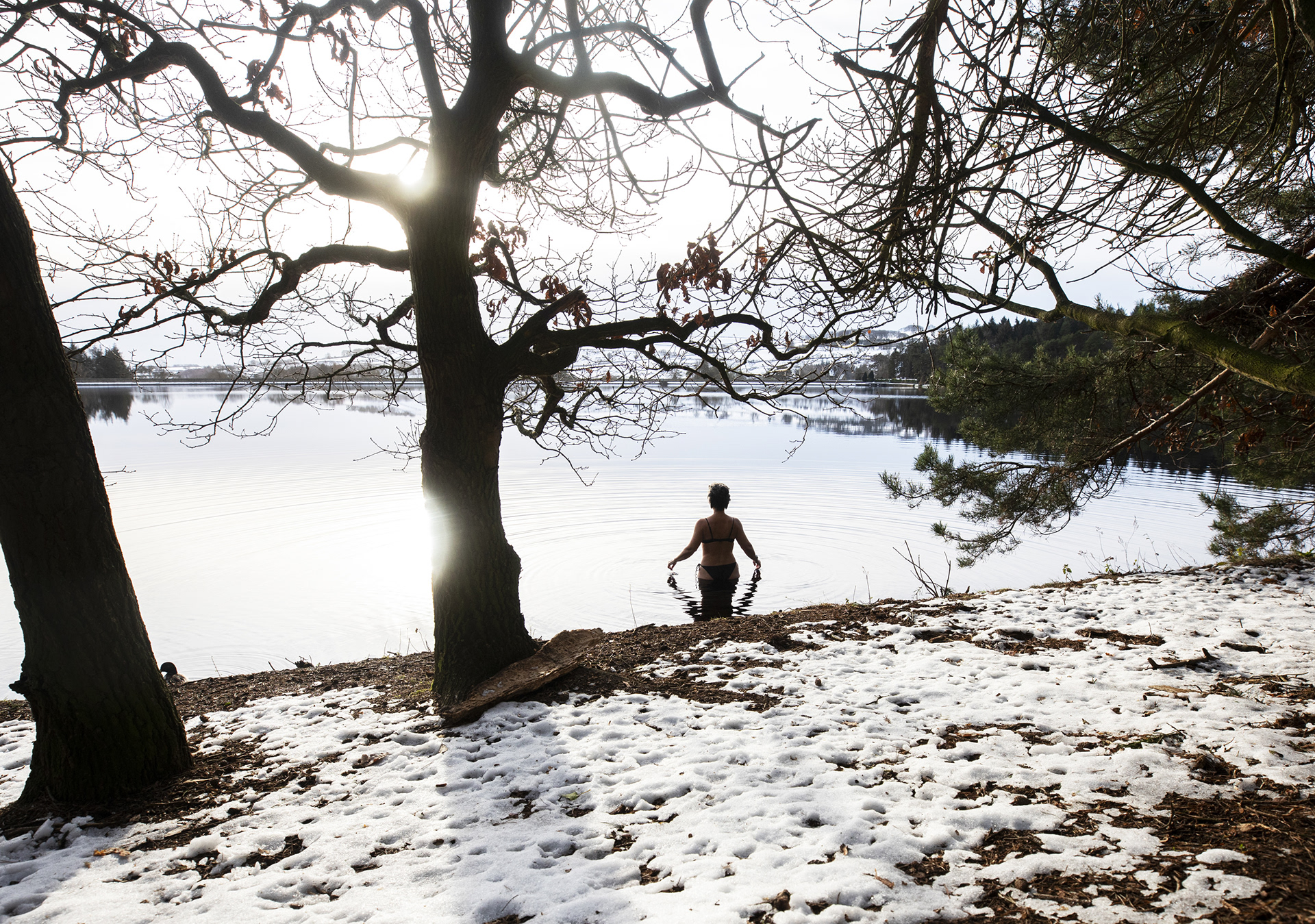
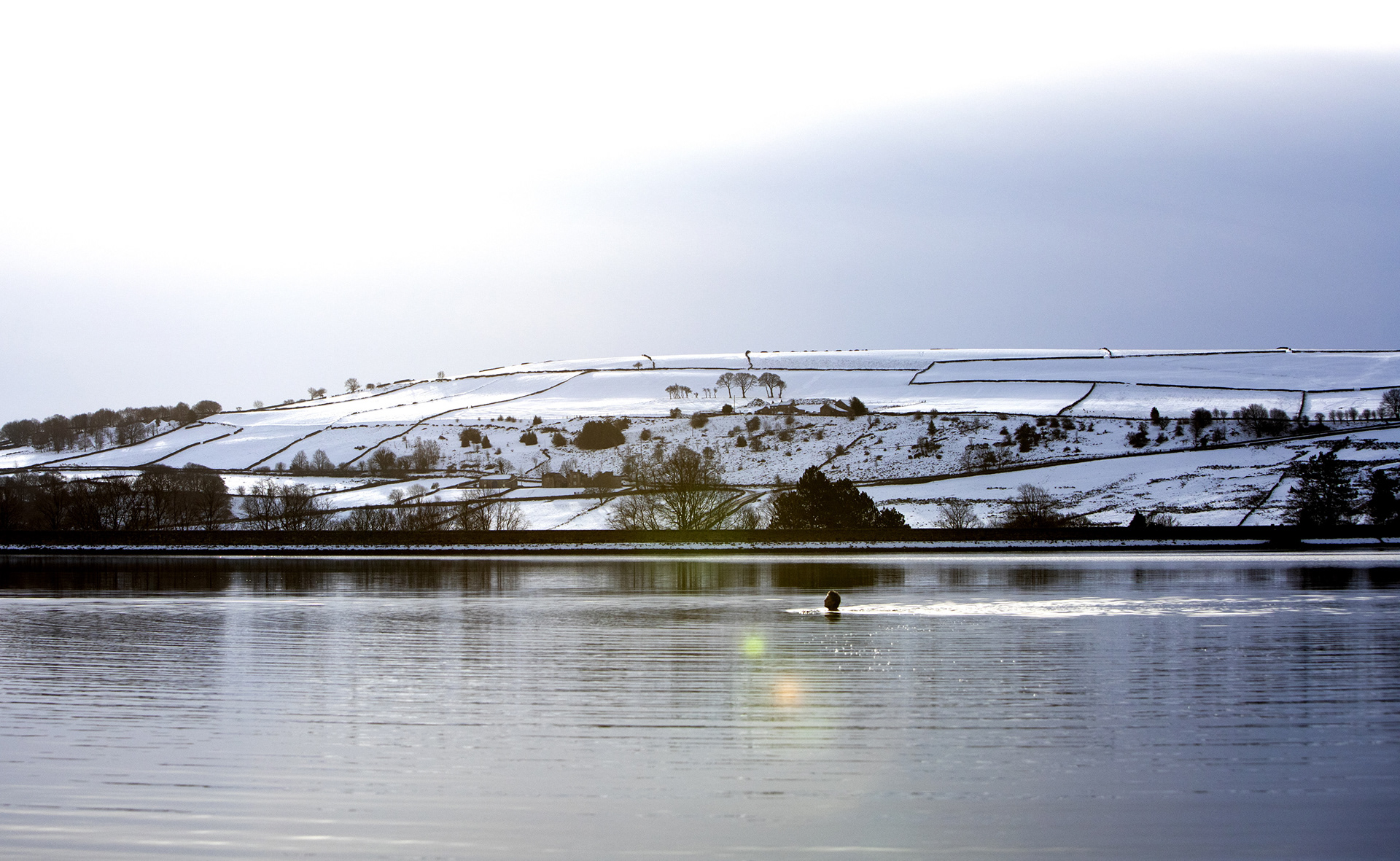

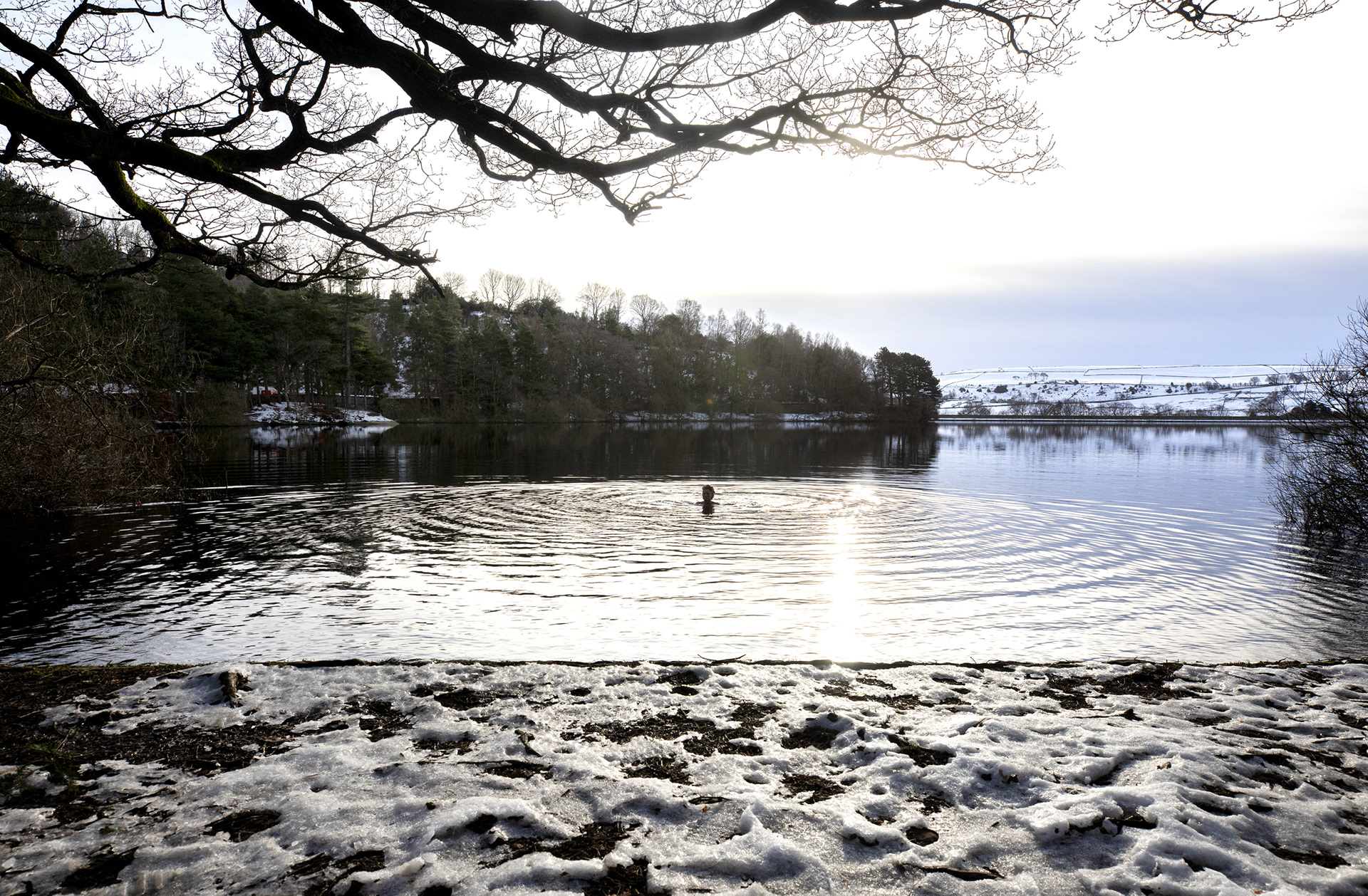
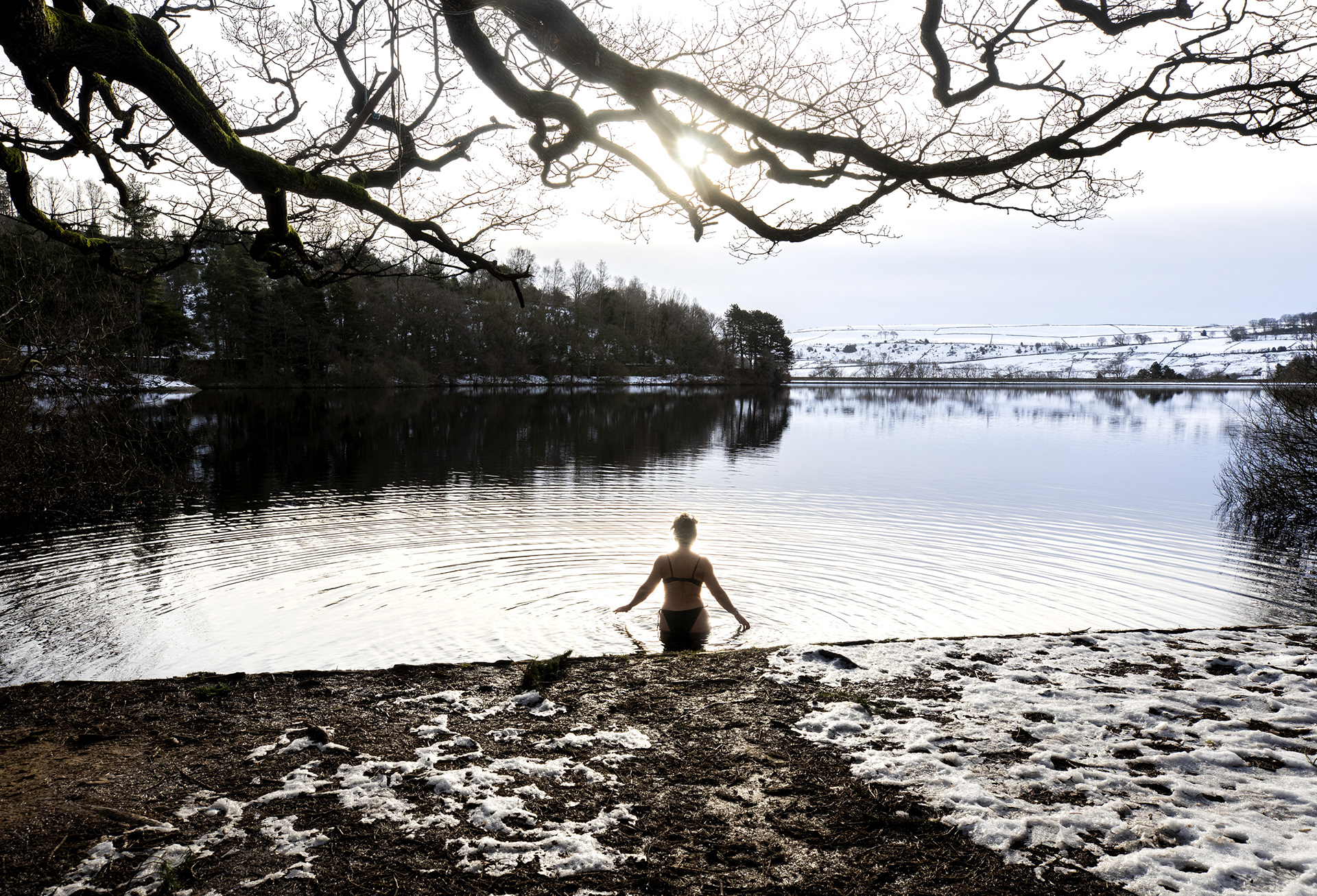
Winter Dipping: Taking the Plunge into Cold Water Swimming
As winter sets in, many are seeking invigorating ways to boost their physical and mental wellbeing. One increasingly popular activity is cold water swimming, with enthusiasts braving chilly temperatures for a refreshing dip.
Kate, a seasoned outdoor swimmer from Sheffield, is a testament to the benefits of this bracing activity. Having started during the 2020 lockdown, she’s become a passionate advocate. “I get the buzz when I get in cold water,” she explains. “I’m a real adrenaline junkie. My friends call me a hardy bird.”
Beyond the thrill, Kate, who owns The Retreat Laser Clinic specializing in laser hair removal, skincare, and massage, highlights the positive effects on the skin. “Cold water is also great for the skin,” she says. “I feel alive after a cold dip.” On a recent outing, Kate even remarked, “It’s quite warm today,” showcasing her acclimatization to the colder conditions.
Benefits of Cold Water Swimming:
While it might seem daunting, cold water swimming has been linked to several health benefits:
Improved Circulation: Exposure to cold water constricts blood vessels, followed by dilation as the body warms up, improving circulation.
Boosted Immune System: Some studies suggest that regular cold water immersion can stimulate the immune system.
Mental Wellbeing: The shock of cold water triggers a release of endorphins, which can improve mood and reduce stress.
Reduced Inflammation: Cold water can help reduce inflammation and muscle soreness.
Tips for Beginners:
If you’re considering taking the plunge, it’s important to start safely and gradually:
Start Slowly: Begin with short dips in warmer months and gradually decrease the duration as the water gets colder.
Never Swim Alone: Always swim with a buddy or in a supervised group.
Acclimatize Gradually: Don’t jump straight into icy water. Allow your body to adjust slowly.
Listen to Your Body: Pay attention to your body's signals and get out if you start to shiver uncontrollably.
Warm Up Afterwards: Have warm clothes ready and a hot drink to help you warm up quickly after your swim.
Check Water Quality: Ensure the water is safe for swimming and free from pollution.
Consider Equipment: Wetsuits, gloves, and neoprene boots can help you stay warmer for longer, especially when starting out.
Cold water swimming can be a rewarding experience, offering a unique connection with nature and a boost to both physical and mental health. However, it's crucial to prioritize safety and listen to your body throughout the process. As Kate demonstrates, with the right approach, even the coldest days can offer an invigorating and revitalizing experience.
